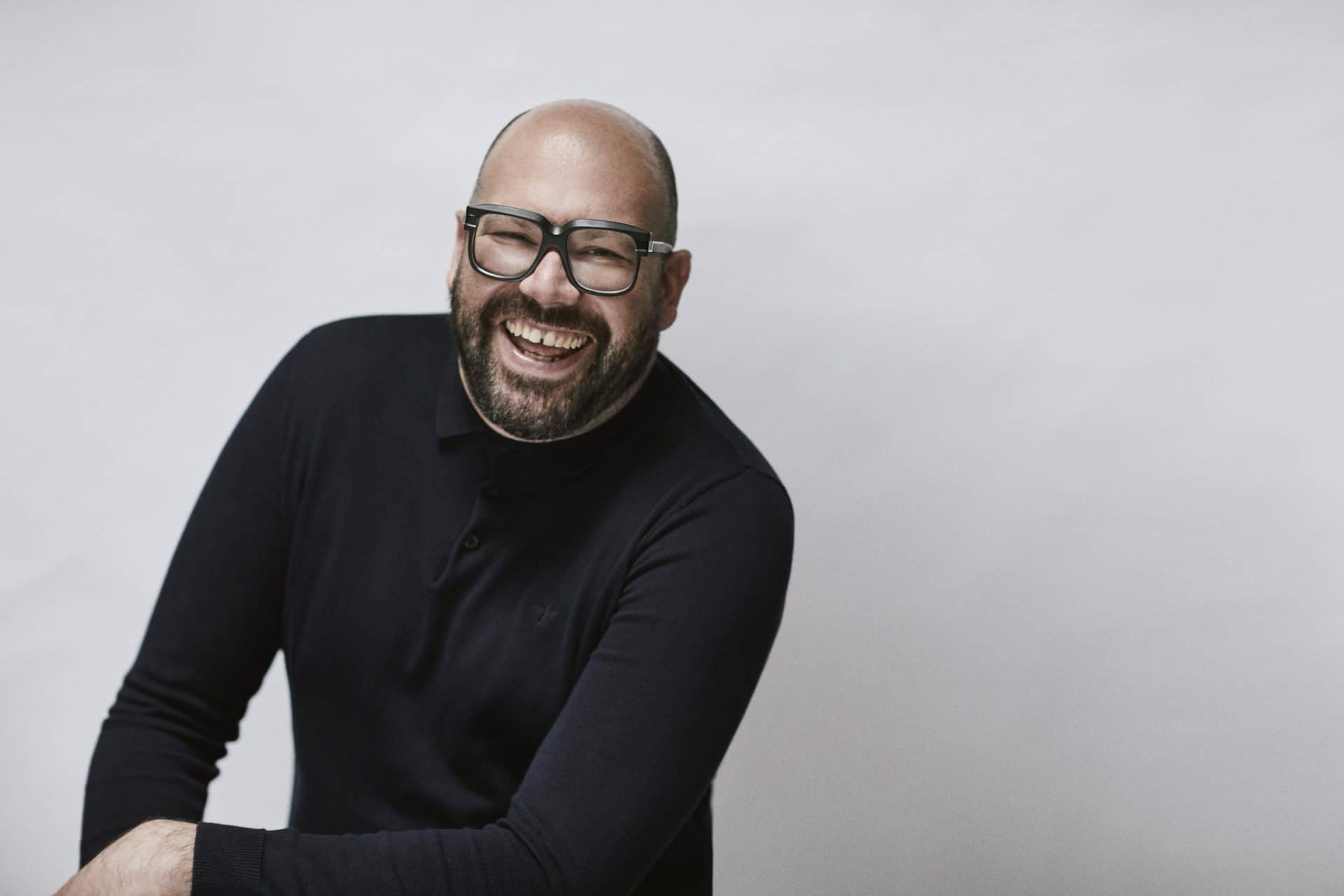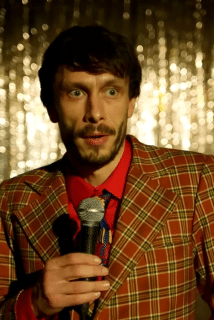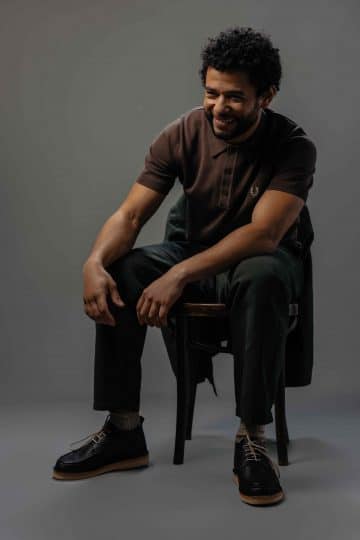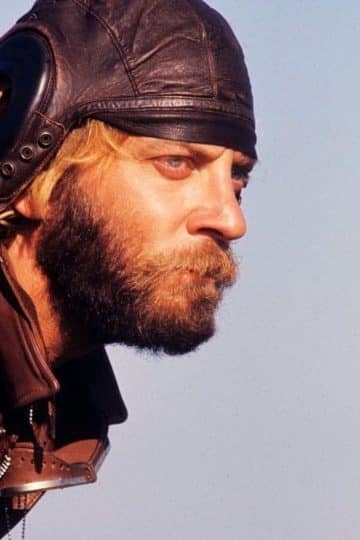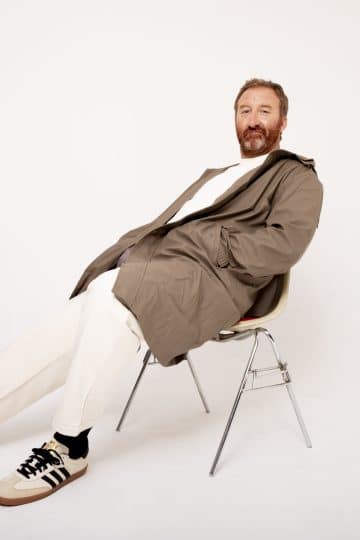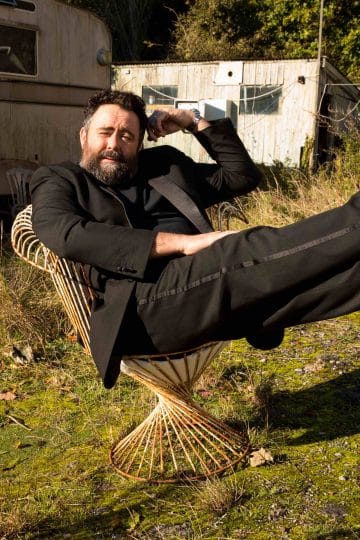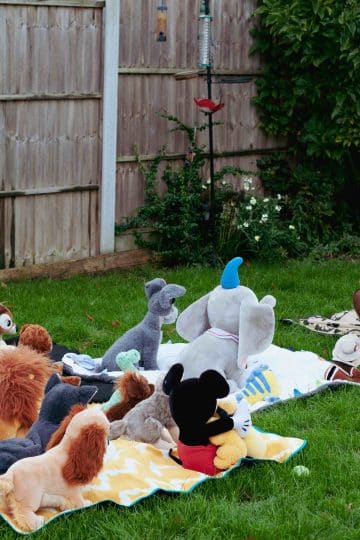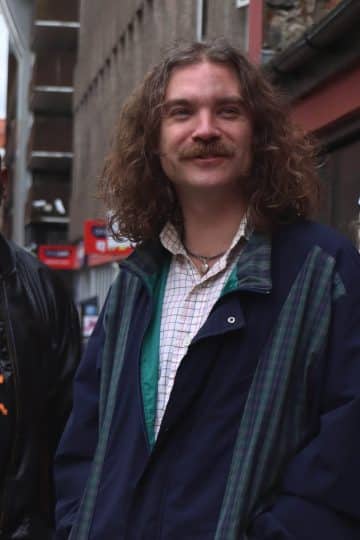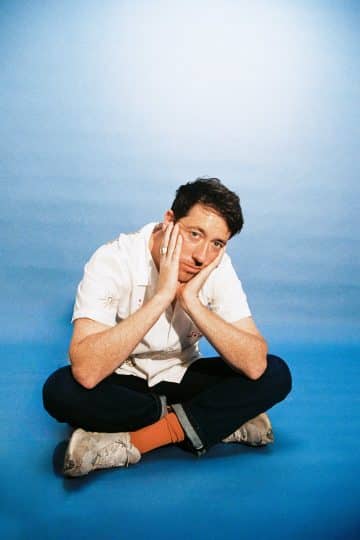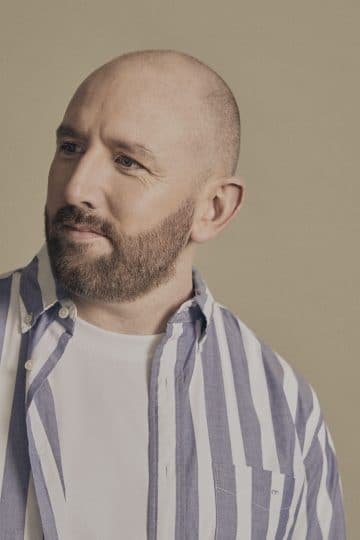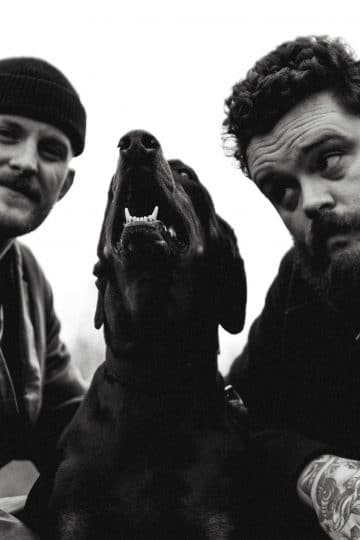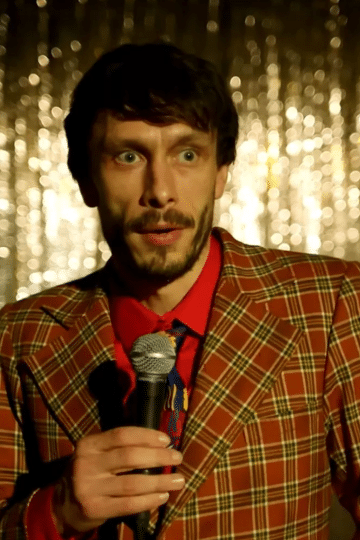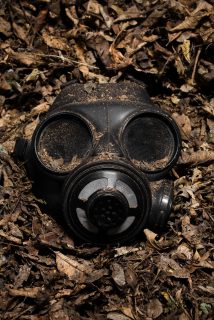Tom Davis on ‘King Gary’ and battling anxiety
Culture
Tom Davis, of 'Murder in Successville' and 'Paddington 2' fame, talks to us about series 2 of 'King Gary' and how he deals with anxiety.
Tom Davis has kept us very entertained of late with the ‘Wolf and Owl’ podcast with Romesh Ranganathan which was particularly compelling listening during the Euros, as the pair articulated and skewered the excitement in the country for that short period, and then that depressing aftermath. Over lockdown Tom also kept us entertained with ‘King Gary’, which may be our favourite cult discovery of the last year. Well, as much as a mainstream BBC One sitcom can be any kind of ‘cult discovery’…but you know what we mean, with Netflamazon eating up our hours, it can be easy to ignore the main channels if you want the smartest TV of the moment. ‘King Gary’ may hit trad comedic notes as it tells the story of a head of a family, a ‘geezer diva’ played by Tom, getting into scrapes in suburbia with his wife Terri, and contesting a rivalry with his neighbour Stuart (Romesh). But as it draws you in, you realise there is a lot more going on, as we see masculine performance laid bare in all its ridiculousness but also with considerable empathy. Gary is a product of his environment and his family, particularly his old school dad, Big Gary, which doesn’t mean he is suited to it. The man seems to be clinging on for dear life half the time, swept along in pettiness and paranoia, almost helplessly. The show is funny, relatable and represents an affectionate dissection of British masculinity. We managed to speak to Tom about the show, his rise from builders’ sites to film and TV greatness, and what he does to keep his own anxiety issues in check…
How have you been since the end of the Euros and what did you make of the abuse to the players?
The ramifications of the finals felt like quite a struggle. Firstly going out of the tournament, and then the reaction to it, I found quite sad. We should have be able to look at this as a valiant effort by a great young team, but everything else that followed was a sad indictment and I felt shame. It’s just very sad that that’s how some people chose to react. You almost thought we had got past that, that this diverse, young England team have given hope for the whole country. It was a kick in the stomach that people would sort of alienate certain members of that team in any way. Because you viewed things through the prism of the team you thought things have changed, somewhat.
I just think that football should be really inclusive, and having talked to different people during a tournament, from different backgrounds, they felt for the first time accepted within football. I went to a number of the games, and it was a very diverse and fun crowd. And I think that was so special. But that last game seems to signify that there’s a lot of work to be done within football, but also within this country, and with us as humans. There’s a lot of people with closed minds. Hopefully, that that isn’t the way forward, especially for younger generation. Hopefully, what we can do for generations coming up is say that this isn’t acceptable.
It’s amazing to see the effect they’re having on kids, like all the messages Marcus Rashford has had – they’re such positive role models…
Yeah, and I think it’s right across that team: Declan Rice and Marcus Rashford, Sancho, Harry Maguire. One of the biggest things is that if you look at Kalvin Phillips, a lot of them have been released in their careers or things haven’t gone their way but they are given a resilience. It’s one of the things that we have to be able to really teach young people, that your success is an incredible thing, and the hope is that everyone at some time can meet with success, but the truth of the matter is every one of us is going to meet with failure. I’ve met with it many times. Being able to live with it and working out the best way of accepting it and moving on from it is the thing that we should be teaching youngsters in school.
How do you deal with successes and failures? Are you quite good at keeping your feet on the ground through anything?
The biggest thing that runs through my very core is imposter syndrome. I wake up every day like Charlie in the Chocolate Factory, but he’s not actually won the Golden Ticket, it was just a wrapper. That’s the thing I live with.
You spend your time thinking the successes that come in, they’re gonna last forever. They’re not gonna last forever. And the failures aren’t gonna last forever. Sarah Millican had this amazing thing about if you have a good gig, enjoy that good gig that night. But at 10 o’clock the next day, that’s a past memory, move on. Don’t live in that gig. And the same with a bad gig. Mourn it, you know, go down to KFC, or smash down a load of Krispy Kreme doughnuts and have a few pints – but the next day, that’s it. It’s just something that’s gone.
I think it’s a really great lesson for people in any walk of life. You only have to look at Gareth Southgate. Look at what he’s achieved. What did failure make him into?
I think failure’s important in our industry as well. I was fortunate to do ‘Murder In Successville’, to make something that was very different, very unique and ride the wave of a show that grabbed people’s attention and built a fan base. But straight after that we did ‘Action Team’, which I’m proud of, but it didn’t have the same success.
There were things in that show that didn’t work that I was too green about – maybe I should have listened to advice, when I probably thought I knew best. Six episodes is not very successful show. However, the failure of ‘Action Team’ taught me more than anything else I’ve ever done. Because it taught me the script is never finished, you need to keep making it better. As a performer it taught me selfishness is going to kill any show, you have to be giving with your performance and giving to others around you. I learned so much from that show not being the hit that maybe I and the people around me thought it would be. The learnings have bled into ‘King Gary’ and everything else I’ve done subsequently.
What have you taken from the last year in terms of self growth or positivity?
Hopefully it’s brought resilience, and made all of us realise the power of family. Of course, it’s been horrible, I can’t remember a time I’ve felt my mental health being pushed and pulled around as much as it has during this. But through that, I’m fitter than I was when I went into it because I found very quickly when I was coming into this pandemic, that drinking wasn’t going to be the answer. Getting up in the morning and working out was.
To ‘King Gary’ then – how’s the response sort of been to that? And has it changed people’s perceptions of you?
Firstly, the response has been incredible. It came out just before lockdown so a lot of the response was virtual on Twitter or Instagram. You get scared someone when you’re doing a mainstream BBC One show, you realise that you’ve somewhat let the wolf into the chicken coop but the response in general has been incredible. When I was going to the football I was going out a little bit more and you realise how many people had really enjoyed it. The show’s primary function isn’t to change the world but hopefully it’s made people laugh and gives people someone to laugh at and that someone’s been me. I think perception wise, I suppose it’s just a different character isn’t it? A lot more people shout Gary at me or ask me where Terri is. People told me when they heard I was doing a BBC One sitcom, get ready, because you’re really in the eye of the storm and, and everyone’s gonna have an opinion on it. It’s comedy, it’s very primitive. ‘Did I laugh? No, I didn’t laugh, so I don’t like that programme.’ Or, ‘I did laugh, I love that programme.’ It’s very evident, so, again, that toughens you up. But I’m immensely proud of it. I’m proud to have made a show about a world that I grew up in, about people I grew up around and making sure that it’s very affectionate and every character has that sort of love.
When you were writing about Gary in particular were you consciously trying to bring together different aspects of being a man, and a particular kind of British man?
Yeah, in the first series, I think we nodded to that a bit. The first year is always really about establishing characters, especially in a sitcoms the first series is like new neighbours moving in. You’re like, ‘Oh, my God, I like these people’, or ‘We’re gonna move house and never talk to them.’
For the second series, me and James [De Frond, co-writer] were really keen on addressing certain male issues, men’s mental issues. Both of us suffer with anxiety. Now I know what it is, I can meditate, there’s things I can do. And I’m very fortunate, my wife is amazing at noticing trigger points for me. Then I go back and realise I’ve always had anxiety since I could speak. I look back at my school life, and what a crippling thing it’s been. Back then we had no way of knowing really what it was or how to control it. So with Gary that that’s something that runs through it, also paranoia. Some of the stuff in the new series with Stuart and him being divorced and having another man crying in front of you. We really wanted to address how men deal with other men’s problems. We’re very fortunate in 2021 that we’re having this conversation which is something we weren’t doing three years ago, five years ago. We’re just starting to say this might be a bit of a problem.
I’m lucky enough that I was born with two parents who were keen for me to show my emotions. Don’t get me wrong, they weren’t perfect but it always interests me to see, from working for years in very male dominated areas, how people deal with their emotions. I mean, there was no bigger thing than watching what happened after we went out of the Euros. How different people deal with it. How much pressure do you put on England winning changing your life? And actually the truth of the matter is it’s been incredible, but the next day, you still have to go to work. And then so much of that’s boiled down to this anger. And that anger can be about fear. All these things are closely linked and we’re starting now to talk about how people feel. There’s a long way to go. And I think with Gary, when you see this series, with Episode Five we really wanted it to feel like a man about to get married but is on the cusp of a mental breakdown. Anxieties and constant paranoia is just ripping through his brain. I find writing the whole thing quite cathartic.
Do you have a sense of responsibility with showing being a man then, in that you wanted to touch upon weighty things?
Yeah, I think it’s showing the generational thing of men and their mental health. Where you go from Big Gary who’s sort of toxic masculinity personified really, his way of living his life is almost like a dinosaur, and then Gary’s in this weird, strange world of someone who’s aware of how the world is changing, is aware that the way his dad lived his life isn’t the correct way, and how he’s been brought up as a child isn’t really right. He was probably forced to run before he could walk and forced to be a man that he isn’t necessarily, because Gary’s quite a sensitive person. You can see that in the love of his son, in the love of his wife. He has a need to be accepted, which sometimes can come across as being pushy in a situation, but a lot of that is actual shyness and fear which turns to: ‘I need to be as big as I can.’
I was brought up around a lot of people and know a lot of guys even now who, when going out for a drink, going into a social situation, became almost like a performance piece. They had to put on ‘oh, I’m this geezer.’ That in itself is only fuelled by anxieties, only fuelled by mental health.
And then you have the third part in the chain which is Gary’s son who’s got his real grip on life and who he wants to be. And his force of character is a really strong part of episodes one and two in particular. It’s an important part of the jigsaw of this family and what they’re becoming.
So yeah, I think there is a responsibility for myself and James as writers and creators, to hold a mirror up to men from this world and sort of say, this is our perception of it. It’s very honest, we’re not writing about a world we don’t know, it’s about the world we’re from and still very much inhabit now.
And it’s important to be able to deal with those issues, but also to be able to laugh at them as well.
Yeah that’s what the British do better than anyone, right? Self deprecating humour started with the English. What became very clear to me was when being around people from other nations whether playing in football games or filming with sports stars from different walks of life is when you’re self-deprecating, like, some people just don’t get it. People think you’re genuinely hating yourself. And actually it is a defence mechanism.
I think it’s important to be able to hold a mirror up and laugh at things and go, ‘look, this is okay.’ Gary at times is the most extreme version of that. I suffer with all these things, but I have a lid on it because I read about it and I like to listen to podcasts about it. I think it’s good to listen to men who have been very successful, you hear he has the same issues. Laughing at these problems is one of the first things to do. To be able to laugh at anything is acceptance for me.
And how was the actual filming?
It was really good, real fun. I think everyone felt so lucky to just be out and actually filming and being able to work. We’ve got a real family atmosphere that surrounds the set, there’s a lot of laughter. You’re making comedies, you want people to be laughing, and having a good time. Whether they’re a runner, an actor or producer, whatever, you want people turning up on set and enjoying the job enough that they’ll it remember fondly. So yeah, it was a real fun set. We were filming it just as lockdown eased. There was an air of being very, very fortunate to be making this thing and everyone brought their ‘A’ game across the board. It was an amazing cast that I feel very honoured to be part of in bringing this to life, but actually the crew, they were the people you felt humbled by them turning up and putting in the work they put in during really trying situations at times.
In terms of sort of looking after yourself do you have any bits of advice or tips you can give for people?
I think I think meditation is incredible. Weirdly after the England game, I realised that that was something I hadn’t paid enough attention to, and I found myself getting down in the dumps and feeling a bit low. Actually getting that back in my life has really helped. And it sounds silly because I spent most of my life laughing at people who worked out but any kind of fitness, getting out and walking for an hour or press ups – you don’t need the world to take better care of yourself and try and make yourself as healthy as you can be. The difference between the Tom who started the day with a workout to the Tom didn’t, is so different. That’s a really powerful thing.
What are your big ambitions for the future?
I’ll take it as it comes really. I find myself very fortunate as a guy who not even a decade ago was still working on building sites, so to be here doing what I’m doing, that in itself is an amazing thing. But yeah, I’m very ambitious. I look at films are looking and other television shows, and pushing myself as far as I possibly can. Stand-up is one that has really got my eye at the moment, that’s how I started and then acting took over. I have unfinished business there, it’d be fun to see about getting back on stage.
King Gary series 2 airs weekly from 30th July at 9.30pm on BBC One. All episodes will be available as a boxset on BBC iPlayer from 30th July.
Main photo: David Reiss.
Follow Tom on Instagram:
Trending
Masculinity 5 days ago
Sport 1 week ago
Health 1 week ago

Join The Book of Man
Sign up to our daily newsletters to join the frontline of the revolution in masculinity.



